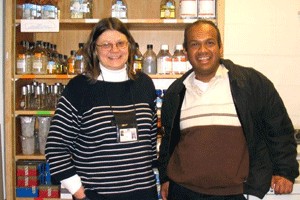
Interdisciplinary Team of UC Scientists Awarded $2 Million NIH Grant for Better Flu Diagnoses
An interdisciplinary team of scientists has received a $2.3 million dollar grant from the National Institute for Allergy and Infectious Diseases, one of the National Institutes of Health (NIH). The name of the grant is Glycan Receptor Mimics for Rapid Detection, Typing, and Susceptibility Testing of Influenza.
With the five-year grant, the team will develop carbohdyrate-based diagnostics for influenza virus. The principal investigators on the grant are Suri S. Iyer, an assistant professor in the Chemistry Department of the McMicken College of Arts and Sciences, and Alison A. Weiss, a professor of molecular genetics in UCs College of Medicine. Also on the team are Monica McNeal and Mary Staat from
Cincinnati Children's Hospital Medical Center
.
specializes in a type of carbohydrate called a glycoconjugate that eventually can be used as a means of detecting the presence of toxins. The carbohydrates recognize the toxins on a surface, react and cause something to change like the color of a solution, which could be read by a measuring device, for example. In this way, the carbohydrates are called a recognition molecule.
Through the grant, the scientists will synthesize a library of tailored carbohydrates. They will then incorporate these synthetic molecules into multiple diagnostic platforms and evaluate their performance to detect influenza using clinical human samples. As in their other collaborations, Iyers research group will create the molecules in their lab that then go to Weiss lab to be tested.

Iyer's newest grant is for his research in developing rapid detection and identification if influenza strains.
Successful completion of this project is expected to lead to the development of rapid, robust, user-friendly diagnostics for influenza virus.
It is really exciting to find solutions to basic problems in infectious diseases, says Weiss. Such advances require an interdisciplinary approach. Our team consists of synthetic chemists, microbiologist and clinicians.
Early and accurate detection of influenza strains is critical for effective countermeasures, especially since new strains for example, the 2009 H1N1 strain can spread rapidly, says Iyer. There is an urgent need to develop diagnostics to detect and type the particular strain and we are excited to work on this problem."
Related News
1/15/2010 UCs Up and Coming Chemistry Faculty Get National Science Foundation Recognition
Every assistant professor hired by UCs Chemistry Department from 1998 to 2008 has received the prestigious NSF CAREER grant, given to junior faculty in recognition of their research and teaching potential.
1/14/2010 Keeping the Food We Eat Safer
UC chemist receives prestigious NSF CAREER grant to develop toxin-detecting biosensors.
Related Stories
Cold-blooded and they make great friends
March 13, 2025
First-year student Josh Lantz starts a Herpetology Club at the University of Cincinnati.
UC joins novel bipolar research and clinical care network
March 12, 2025
The University of Cincinnati is one of four new national institutions to receive $2.3 million each to join the Breakthrough Discoveries for Thriving with Bipolar Disorder (BD²) Integrated Network, a collaborative research and clinical care model with a mission to improve care, interventions and outcomes for people living with bipolar disorder.
Impact of chronic kidney disease escalates around the world
March 10, 2025
The impact of chronic kidney disease (CKD) keeps escalating around the world, and this burden is projected to rise with population growth and aging, according to a study published in BMC Public Health. “The aging population, rising obesity rates and higher diabetes prevalence suggest that the CKD burden will continue to grow,” said Prakash Gudsoorkar, MD, a University of Cincinnati College of Medicine nephrologist and medical lead for the onconephrology service at UC Health.
